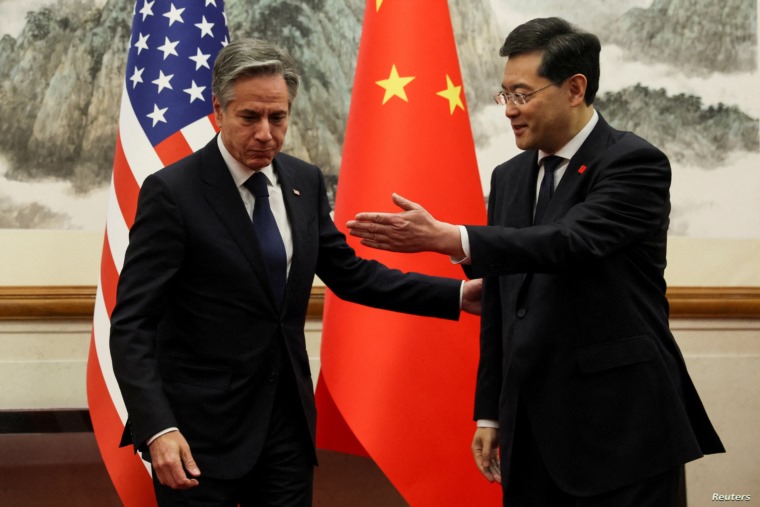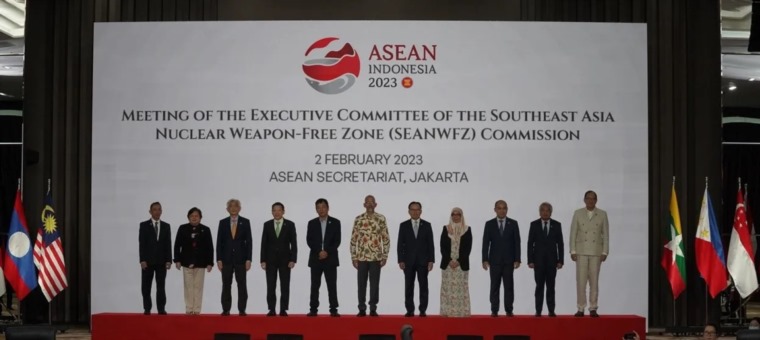In front of China.. America is losing its influence in Southeast Asia
Tuesday 11 July 2023 / 13:30 The past five years have witnessed intense military and diplomatic activity by China in Southeast Asia, as well as in many regions of the world. It strengthened its military presence in the South China Sea, and expanded the deployment of its ships in the sea, and military units to prevent ships of other Southeast Asian countries from fishing in their territorial waters.
Washington’s close friends in Asia are turning away from it, which is a costly direction for the United States, and may become dangerous for it in the future.
China’s threats to Taiwan have increased, and Chinese diplomats around the world adopt an aggressive approach that sometimes amounts to what is known as “warrior wolf” diplomacy. Although it can be expected that this will have negative effects on China’s position in the region, the opposite is true.

Chinese presence
According to a comprehensive and exciting new study Lowy Australian Research Institute Chinese influence in Southeast Asia has increased in the past five years, at the expense of the United States, which is witnessing a rapid decline in its influence in one of the most important arenas of competition between Beijing and Washington, according to US analyst Joshua Korlantzik, in an analysis published by the US Council on Foreign Relations website.
And use Lowe Institute report Entitled “The Landscape of Power in Asia: China and the United States in Southeast Asia,” several indicators measure the regional influence of the two countries through four categories: economic relations, defense networks, diplomatic influence, and cultural influence. The report said that the United States “is losing influence to China in Southeast Asia over the past four years in the four categories.”
A study by the Joseph Isaac Institute or Institute of Southeast Asian Studies Previously in Singapore, a poll found that most respondents believe that China is the most dominant economically, politically and strategically in Southeast Asia.
Fulcrum Commentary by Lye Liang Fook – China’s “model” relationship with Southeast Asia has the effect of constraining the foreign policy options of these countries by prescribing the elements it would like to see in the relationship. https://t.co/lL6XkHXBxn#SoutheastAsia
— ISEAS – Yusof Ishak Institute (@ISEAS) April 27, 2023
American retreat
These developments come to reveal the extent of the decline in American influence, as a study by the Lowe Institute in 2018 said that the United States is the most influential country in the 3 countries in the region, and that the influence of Washington and Beijing in Thailand was equal.
However, the paradox is that American influence in Southeast Asia is eroding, although many countries in the region, such as Vietnam, Malaysia, and Indonesia, are clearly terrified of the growing Chinese military moves.
These concerns appeared in the Lowe Institute study, which said that “the United States is still the dominant military power in many Southeast Asian countries,” despite its decline in its rating according to this measure as well.
With the exception of the Philippines, other countries in the region, despite their fear of China’s military might, increasingly accept Chinese hegemony.
The author of the book “Beijing’s Global Media Attack: China’s Disproportionate Campaign to Influence Asia and the World,” Korlantzik believes that the main reason for China’s great economic influence in the region is the growing feeling of Southeast Asian countries that they have no choice but to align themselves with Beijing.
The Lowe Institute study notes that last year, “the US’s relations with all Southeast Asian countries were weaker than China’s relationship with those countries.”
In addition to trade and investment, China’s presence has increased as a last resort for those countries to obtain loans, when other rich countries in the world were suffering from debt and economic crises.
And while the United States at one time helped arrange huge economic rescue packages for several countries in the region from Thailand to Indonesia, we see that this American role has declined in recent years.
Even Malaysia, whose recently elected prime minister, Anwar Ibrahim, is a longtime supporter of democracy with close ties to the United States, is increasingly drawing closer to Beijing and distancing itself from Washington, due to large Chinese aid and investment in his country. Moreover, Malaysia and other countries such as Thailand, are increasingly buying Chinese weapons, indicating China’s rise militarily and economically. The Lowe Institute believes that the decline in US influence in Malaysia between 2018 and 2022 was the largest compared to the decline in its influence in any other country in the region.

economic integration
At the same time, China’s economic rise in the region seems unstoppable, while Washington does not seek to support its position in any competition for economic influence. In the past five years, China continued to strengthen itself for economic integration in the region, entered into many regional trade agreements, and developed some of its tools, in exchange for Washington’s withdrawal from trade agreements involving Southeast Asian countries such as the Trans-Pacific Partnership Agreement.
Finally, Joshua Korlantzik believes that the United States still has a choice, either to continue the current approach and continue to lose influence, or to rethink engagement in the region.
In any case, US policymakers should bear in mind the importance of Southeast Asia in any effort to deter China from invading Taiwan, or to impose a huge economic cost on Beijing if deterrence fails and does invade Taiwan.
But continuing the status quo is not an attractive option. As the reports of the Lowe Institute and Southeast Asian Studies indicate, Washington’s close friends in Asia are moving away from it, which is a costly direction for the United States, and may become dangerous for it in the future.



